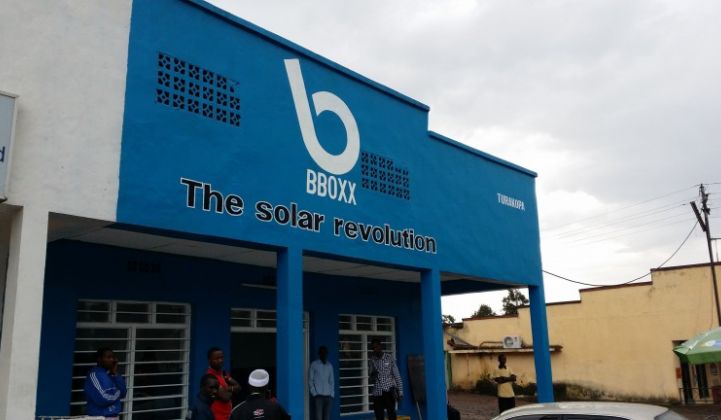French energy giant Engie was the lead investor in a Series C funding round for off-grid solar startup Bboxx to expand its presence in Kenya, Rwanda and beyond.
The startup has 36 retail outlets in the two East African countries and expects to scale up to 400 retail shops in the next two years. The retail stores are franchised in the two countries, and there are also distribution networks in more than two dozen other countries.
“We want to provide the on-grid experience in the off-grid world,” said Mansoor Hamayun, CEO of Bboxx. “We’re as much an appliance business as we are an electric business.”
The company is selling about 200 systems per day, which come with a 50-watt roof-mounted solar panel and a lead-acid battery, phone chargers and LED lights. People can add on other appliances such as televisions, radios and electric chargers. Bboxx is also piloting internet access.
Bboxx also sells systems as large as 1.5 kilowatts, which are appealing for those with unreliable grid connections in countries such as Sierra Leone. “We are really selling reliability,” says Hamayun.
“We are excited about the growth potential for the African off-grid solar market and delighted with Bboxx’s rapid development,” Laure Vincotte, managing director of Engie Rassembleurs d’Energies, the division that invested in Bboxx, said in a statement.
Bboxx sees itself as both a hardware and a software company. It remotely controls and monitors the systems, while modulating the charging to get the most out of the batteries. Microgrid companies that need remote monitoring for their systems are also using the control software. The company sees its remote-control and monitoring capabilities as a differentiator that sets it apart from a growing market of startups that are also targeting off-grid communities for home solar systems.
As with other companies, including Off-Grid Electric and M-Kopa, Bboxx offers a pay-as-you-go model. It takes about 10 years for the typical customer to pay off the entire Bboxx system, and then extra appliances can be purchased in cash or financed over a few years' time. Bboxx is currently undertaking the industry’s first securitization in Rwanda.
Investment from a global energy giant is now another differentiating factor for Bboxx, although other energy companies will increasingly pursue this sector. “This industry needs a lot of capital,” said Hamayun. About $200 million flowed to off-grid electric solutions in 2015, with a significant portion off that going to Off-Grid Electric.
The market in developing countries is vast, but it’s not only about access for those living entirely off the traditional electric grid. There are an estimated 1 billion people with intermittent access to electricity that could also benefit from decentralized solutions. “There’s a market for mini grids; there’s a market for grid extension; there’s a market for home solar systems,” Hamayun added.
In each region, the accessories for the home solar system and the mobile payment options will have to look a little different to suit local needs. In Pakistan, for example, some systems are as small as 30 watts.
Bboxx will tailor its product to local markets, and also push the envelope of what it sells. In the future, for instance, it plans to use its stores and distribution channels as a pathway to offer products that rely on more than just solar. “Maybe we can sell cooking gas as-you-go,” suggested Hamayun. He also suggested clean cookstoves as a possible future offering.
Beyond product expansion, Hamayun said his company would use its new round of financing to expand in West Africa, including the Ivory Coast and Senegal.
Other investors in the round included MacKinnon, Bennett & Company, KawiSafi Ventures, and existing investors Khosla Impact Fund, Bamboo Finance and DOEN Foundation. KawiSafi Ventures is a $100 million private equity fund focused on off-grid energy solutions in East Africa, and Bboxx is its first investment. Bboxx has raised a total of $39 million.



